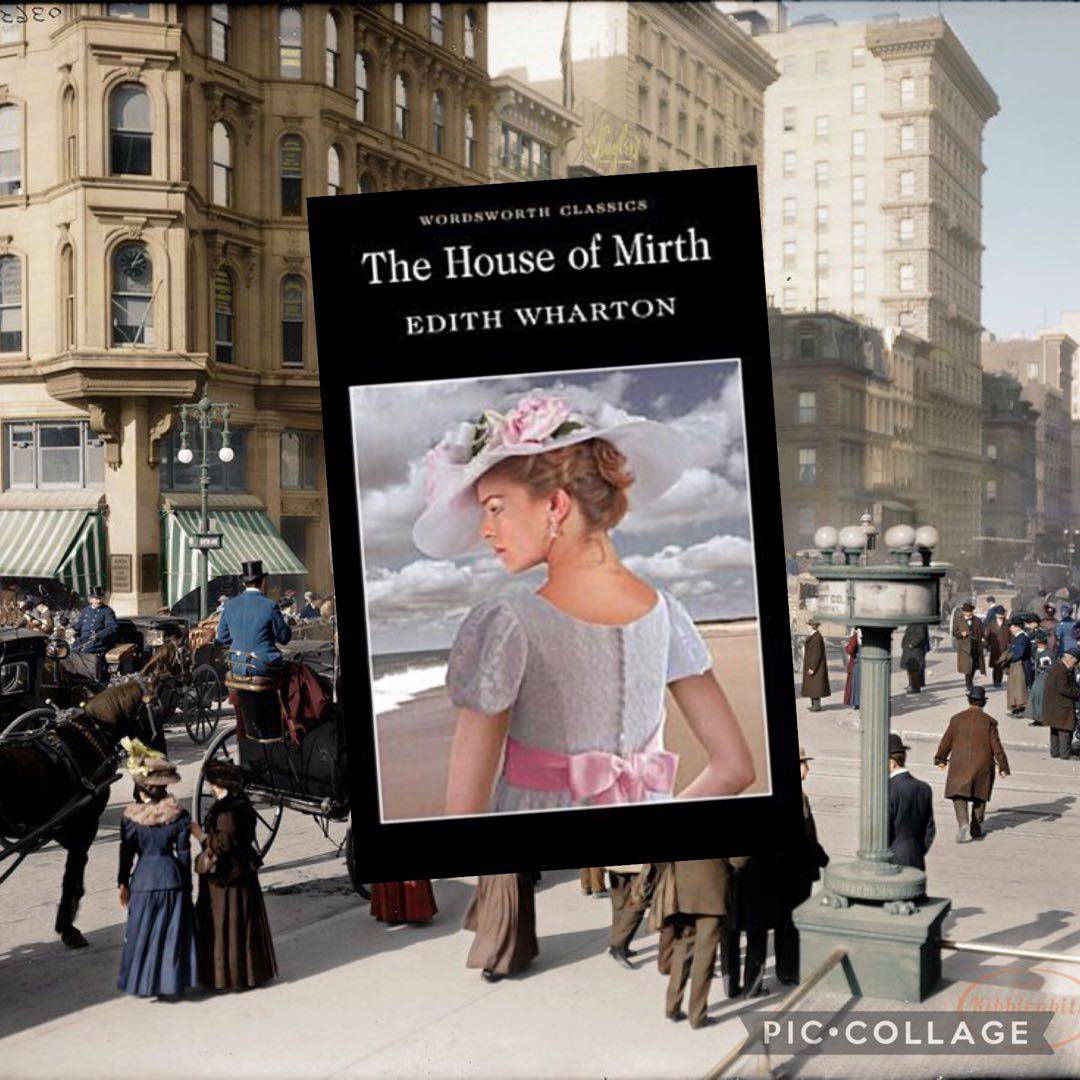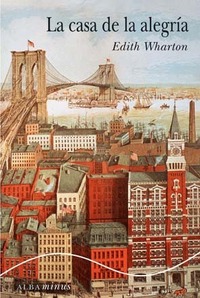Take a photo of a barcode or cover
dark
mysterious
reflective
sad
slow-paced
Plot or Character Driven:
Character
Strong character development:
Yes
Loveable characters:
No
Diverse cast of characters:
Yes
Flaws of characters a main focus:
Yes
"What did you think?" These four innocent words rest atop the box in which I am expected to write my thoughts on The House of Mirth, but honestly, I'm so blown away that I can't really say with any clarity what I think about this book. I really loved Lily Bart. She was not only able to use her social charms to keep her cohorts interested in her, but I as the reader was equally easily reeled in. However, I found it quite sad that while Lily was an expert on others and what would make them tick, she did not have equal insight into herself. To be fair, she showed some insight into what she truly wanted, usually instigated by Selden's presence in her life, but these glimmers were too few and far between for Lily to really make any use of them. I don't want to give anything away about this book and all its glorious twists and turns, but the ending is actually pretty great because Lily's immediate wishes actually do get answered. This book reads kind of like Moll Flanders in reverse, so if you liked that book, you might also like this one. It also had the feel of a Jane Austen novel, though not as light with its subject matter. I confess myself satisfied.
challenging
dark
emotional
sad
tense
medium-paced
Totally enamored with Wharton's way with words (say that ten times fast). Her sentences are constructed of flowers and bite -- never shying from harsh or unforgiving commentary, but always packaging it artfully. The style appealed to the side of me that delighted in, and devoured thoroughly, the works of Oscar Wilde.
The story here is by no means revolutionary or unfamiliar, but is presented with a uniquely delightful edge. And, I personally found Lily Bart to be a fascinating protagonist to follow.
The story here is by no means revolutionary or unfamiliar, but is presented with a uniquely delightful edge. And, I personally found Lily Bart to be a fascinating protagonist to follow.
“Do you remember what you said to me once? That you could help me only by loving me? Well-you did love me for a moment; and it helped me. It has always helped me.”
Wharton's book is a beautifully written piece of literature but I don't think I have ever been so frustrated by a book.
The main character, Lily (or Miss Bart), might just be the early-20th century version of the blonde in the horror movie. You constantly want to scream at her not to make those ridiculously bad decisions that, as a reader, you know will only help bring her down but, of course, she does as she pleases and her life becomes a real nightmare.
I'll admit I kept reading because I had high hopes for the end but I guess a frustrating book must have a frustrating ending. And I'm not saying every book should end well, or that every soulmate should end up happily married but the drama was just too strong for this one. I guess this is because I'm reading this book with a 2018 perspective that I'm simply not satisfied with the dramatic death of the young and beautiful the very day her life could have been saved by who is identified very clearly from the very beginning as the love of her life. It's just too obvious and aren't we all a little sick of Shakespearien tragedies.
So maybe I didn't quite get everything the book had to say about young women being trapped in their society and the inevitability of one's end. I just got very frustrated by the misunderstandings that could (should) have been resolved simply with a little more communication.
That said, you should still read that book anyway because it's still good and interesting, especially when thought of in the context in which it was written, you just have to remember that this is no Bridget Jones.
The main character, Lily (or Miss Bart), might just be the early-20th century version of the blonde in the horror movie. You constantly want to scream at her not to make those ridiculously bad decisions that, as a reader, you know will only help bring her down but, of course, she does as she pleases and her life becomes a real nightmare.
I'll admit I kept reading because I had high hopes for the end but I guess a frustrating book must have a frustrating ending. And I'm not saying every book should end well, or that every soulmate should end up happily married but the drama was just too strong for this one. I guess this is because I'm reading this book with a 2018 perspective that I'm simply not satisfied with the dramatic death of the young and beautiful the very day her life could have been saved by who is identified very clearly from the very beginning as the love of her life. It's just too obvious and aren't we all a little sick of Shakespearien tragedies.
So maybe I didn't quite get everything the book had to say about young women being trapped in their society and the inevitability of one's end. I just got very frustrated by the misunderstandings that could (should) have been resolved simply with a little more communication.
That said, you should still read that book anyway because it's still good and interesting, especially when thought of in the context in which it was written, you just have to remember that this is no Bridget Jones.
emotional
sad
tense
slow-paced
Plot or Character Driven:
A mix
Strong character development:
Yes
Loveable characters:
Complicated
Diverse cast of characters:
Yes
Flaws of characters a main focus:
Yes
emotional
reflective
sad
slow-paced
Plot or Character Driven:
Character
Strong character development:
Yes
Loveable characters:
Yes
Diverse cast of characters:
No
Flaws of characters a main focus:
Complicated
So freaking depressing.
With that being said, these Old New York Wharton books are a drug.
I beg of you, Edith, make me happy! Just once!
Spoiler
Selden was going back for Lily, to share mysterious (love?) words, but she was DEAD! I was so heartbroken!I beg of you, Edith, make me happy! Just once!

I'm working through Wharton's longer fiction with a group on Litsy, and this is her fourth work, and second novel. It's also her first really successful work, an instant big seller in 1905, and now a classic. And it's a wonderful novel. Wharton attacks the culture of New York City's extremely wealth leisure class through fall of Lily Bart. Raised by wealthy parents, Lily's father hit financial ruin, and was basically discarded at that point by her mother. But Lily's mother sees potential in Lily's face, she thinks Lily can marry back into money.
When the novel opens Lily is 29 and still single. And we watch as she plots for marriage and then doesn't carry her plots through. The reader is left to wonder what is going on. Lily is clearly the master of the moment in any setting. She's gorgeous and fluid in higher culture, and attractive on several levels. And, supported by her childless aunt, she has just enough money to stay in that culture, and enough fortitude to keep her financial stresses out of public view and out of her outward character. All she needs is a rich husband, which should be a reasonable object for her. There are offers. But it seems what Lily wants may not want what she thinks she wants. Or there are some contradictions. It many ways this novel is a version of [b:Pride and Prejudice|1885|Pride and Prejudice|Jane Austen|https://i.gr-assets.com/images/S/compressed.photo.goodreads.com/books/1320399351l/1885._SY75_.jpg|3060926] without the happy ending. Ultimately Lily is left to the fate of her name, a flower drifting in the current, maybe even a cut flower, subject to greater and darker forces. She maybe doesn't fully realize the stakes in the kind of money she mixing with, where $10,000 is disposable, an equivalent of over $300,000 in 2021 dollars.
The cultural expose is likely what originally drew readers to this novel. Wharton was part of this leisure class and was writing what she knew. But it's the writing that makes this book still work today. She was masterful with characters, with witty insight and with situational moments. This novel largely jumps from situation-to-situation (with transitions), many with one-on-one conversations of memorable intensity. It makes for an entertaining and meaningful novel. I imagine this one has broad appeal, so recommended to anyone interested.
-----------------------------------------------
57. The House of Mirth by Edith Wharton
editing: editor: Janet Beer, advisor: Keith Carabine
published: 1905
format: 306-page Wordsworth Classic paperback, published 2002
acquired: September
read: Oct 27 – Nov 16
time reading: 16:32, 3.2 mpp
rating: 5
locations: New York and a stop at Monte Carlo, Monaco.
about the author: 1862-1937. Born Edith Newbold Jones on West 23rd Street, New York City. Spent most of her writing life in France.





